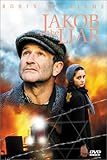Jakob the Liar
The movie Jakob the Liar was
based on the book Jakob the Liar.
Read More About This Movie
Roberto Benigni's Life Is Beautiful aside, milking the Holocaust for laughs is a dangerous game. Even the blackest, most therapeutic humor turns queasy in the shadow of such monstrous evil; it's like dancing on a mass grave. So Jakob the Liar's got a ha...
Read MoreRoberto Benigni's
Life Is Beautiful aside, milking the Holocaust for laughs is a dangerous game. Even the blackest, most therapeutic humor turns queasy in the shadow of such monstrous evil; it's like dancing on a mass grave. So
Jakob the Liar's got a hard road to hoe--its eponymous schlemiel plays out his semi-farcical adventures in the mean streets of the Warsaw Ghetto circa 1944. The skies are always leaden over Jakob's hometown, reflecting the comic climate that pervades this mostly unfortunate adaptation of Jurek Becker's autobiographical book (first filmed in 1975).
Jakob Heym (Robin Williams in overbearingly earnest mode) gets tangled in a string of self-perpetuating lies about a hidden radio, supposedly broadcasting news that the victorious Red Army is nearing. His desperate attempts to convince a clutch of insistently idiosyncratic friends (clichés to a man: Liev Schreiber, Bob Balaban, Michael Jeter, Alan Arkin) and obligatory Nazi bad guys that the radio doesn't exist are complicated by the fact that he's stashed a fugitive kid (a dead ringer--sorry!--for Anne Frank) in his attic--and by abundant evidence that lies are the best medicine for the ghetto's skyrocketing suicide rate. Copious unfunny misunderstandings and pratfalls eventuate in this Holocaust rendition of Fiddler on the Roof (you expect Williams to break into song: "If I were a funny man...."). Ultimately, Jakob the Liar loses its way for good in some very ugly violence and a rather nasty final twist: the film's ending might just be rubbing our noses in another feel-good lie. --Kathleen Murphy
Book details for Jakob the Liar
Jakob the Liar was written by
Jurek Becker.
The book was published in
1975 by Plume.
More information on the book is available on Amazon.com.
|
 |
Read More About This Book
This fable of a Jewish ghetto during World War II is one of the great literary masterworks of the Holocaust. Published in Germany in 1969, it is only now appearing in an authorized English translation. Concerning a former cafe owner who fabricates the sto...
Read MoreThis fable of a Jewish ghetto during World War II is one of the great literary masterworks of the Holocaust. Published in Germany in 1969, it is only now appearing in an authorized English translation. Concerning a former cafe owner who fabricates the story of the Russian army's inexorable advance on the ghetto, and the liberation that will follow their arrival, the tale has the simple power of myths or dreams. A comic tale of unimaginable tragedy, the novel brings vividly to life the doomed inhabitants of the ghetto: Schmidt, the obtuse assimilationist; the child, Lina, who hunts for Jacob's imaginary radio; Frankfurte,r the formerly obese burgher. And Jacob himself, a storyteller whose inventions become like bread to the others, who finds himself trapped in his growing mesh of lies until he is driven to tell the truth. At the end there are two final passages: one in which the Russians arrive to save the ghetto; and one in which they don't. Who is to distinguish between fact and myth?

